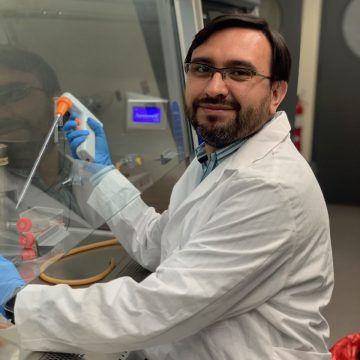Alumnus Spotlight: Javier Jaimes, Ph.D.
Vaccine Discovery for Coronavirus
 Javier Jaimes is an alumnus of the microbiology program at Cornell from which he holds a Ph.D. Now, as a postdoctoral scholar in microbiology and immunology, he is studying virology with a concentration on coronaviruses.
Javier Jaimes is an alumnus of the microbiology program at Cornell from which he holds a Ph.D. Now, as a postdoctoral scholar in microbiology and immunology, he is studying virology with a concentration on coronaviruses.
What is your area of research and why is it important?
My research focuses on the study of how viruses infect cells. Specifically, I study the mechanisms used by coronaviruses to enter the host cell. Studying these processes is fundamental not only to understand the viral biology, but to identify potential targets for the development of preventive and therapeutic strategies to counter these viral infections. This is especially relevant in the context of emerging diseases like the novel coronavirus SARS-CoV-2 which causes the COVID-19 disease. We are aiming to understand how this virus carries out the infection process and how this is similar or different to other coronaviruses like the severe acute respiratory syndrome coronavirus (SARS-CoV) and Middle East respiratory syndrome coronavirus (MERS-CoV). We are also currently working on the development of a vaccine against MERS-CoV that could potentially have an effect on preventing other coronavirus infections. Working with viruses has been the focus of my entire career and I really love working in this field, which is constantly evolving and bringing new challenges every day.
Has the recent coronavirus outbreak affected your research?
Since the COVID-19 outbreak my life has been a continuous race doing experiments, writing our results, and trying to catch up with the humongous influx of information that is getting out in the field. The last few weeks have been really intense. I had to put all my projects on standby so I can put all my effort and focus on the study of the new virus. However, despite the tiredness and stress, it is fascinating to have the opportunity to participate in the response to the epidemic and join the group of scientists from around the globe that are trying to understand this new virus and figure out strategies to contribute to the control of the emergency.
What are the larger implications of your research?
My research aims to understand how viruses enter the cells. This is one of the early steps in the viral infection process and understanding the processes involved in this event is key to understand the disease and to develop strategies to control it. Our main goal with the MERS-CoV project is to develop a vaccine that will induce sufficient protection with the potential to be used in preventing other coronaviral diseases. My project with the new coronavirus, SARS-CoV-2, aims for basic understanding of the entry mechanisms, but also extends to the search of possible targets for treatment.
What inspired you to choose this field of study?
I fell in love with viruses when I was very early in my college education. To me, it was really interesting how these little tiny agents were able to infect and propagate without having their own metabolic machinery but using the host’s cellular one. It literally was a “blowing mind” moment when I heard that for the first time, and since that moment knew I wanted to build a career in this field. Today, after almost 20 years, I still feel happy with my decision, and knowing that my research could potentially contribute to prevention and treatment of viral diseases makes me feel that my work and effort is meaningful.
What book is currently on your bedside table?
My iPad is my sole companion during this crazy influx of information that is currently going on with the coronavirus outbreak. I feel like I have not been able to read anything different in the past three months and still I also feel I am so behind in the race for keeping up to date in this topic.
How did your Cornell graduate education prepare you to succeed professionally?
My experience at Cornell has been amazing. The training I have gotten during my Ph.D. and now as a postdoc has been key to planning my future professional path. After several years of being here, I feel that I am much more prepared to face the challenges of the academic path. Here, I got to attend to several professional development seminars and workshops, and I am currently participating in the Postdoc Leadership and in the NextGen Professors programs, where I have had the opportunity to learn from faculty and other peers about the academic job market and the professorship career.
What skills did you take away from your degree program that help you in your career?
I think two of the skills that I appreciate most from my training at Cornell are how to network with peers and how to contribute to a more inclusive and diverse academic environment. I really value the opportunity to interact with colleagues and collaborate in our research activities, and Cornell has provided me the tools for building strong networks inside and outside the campus. Also, I am committed to contributing to science communication and diversification, and Cornell has helped me to do so.
If you could go back in time to the beginning of your graduate career, what advice would you give yourself?
I feel working in this field is the best decision I have ever made. I cannot imagine myself doing anything different and I really love doing research. If I was able to talk to my past self, I am pretty much sure I would encourage me to continue pursuing this career and maybe I would advise myself to start earlier with studies.
